Over the last few weeks I have been talking about engaging in genuine transformative practice as opposed to just taking on new perspectives.
 The difference is fairly easy to point out but it is often hard to recognize in ourselves.
The difference is fairly easy to point out but it is often hard to recognize in ourselves.
Transformation happens because of major life changes and events that cause us to grow, OR from special practices designed specifically to assist us in our quest for Truth. Transformation takes a lot of work. Sometimes it is thrust on us by life and sometimes we choose it, but either way it is often agonizing.
 You can get a new perspective, however, from reading a book, or watching a movie. Sometimes we even get a big ‘AHA Moment’ out of it and our whole life starts to change, which gives it the appearance of transformation.
You can get a new perspective, however, from reading a book, or watching a movie. Sometimes we even get a big ‘AHA Moment’ out of it and our whole life starts to change, which gives it the appearance of transformation.
However, the truth is often that the real transformation occurred sometime before the ‘AHA Moment’ through life’s trials and challenges. The ‘AHA Moment’ is just a sudden realization of what we have already come to understand. It’s like turning the key in the ignition. Turning the Key doesn’t build a new car, it starts the one that was already there.
True transformative practice is how we build a new vehicle for the Spirit. It is usually not soothing, relaxing or empowering. During true transformational practice there is grueling inner work going on and it can make you cranky, peaceful, sad, joyous, frustrated, calm, excited and tired all at the same time!

Lucky for us, there have been many, MANY people before us who have sought God. They have been from every culture and on every continent, and it just so happens that we are at an amazing time in the history of humanity.
 For the first time ever, there are some very lucky (blessed) human beings on the planet (us) who have access to ALL of the worlds Great Wisdom Traditions, and we can study them from the comfort of our own homes in our spare time.
For the first time ever, there are some very lucky (blessed) human beings on the planet (us) who have access to ALL of the worlds Great Wisdom Traditions, and we can study them from the comfort of our own homes in our spare time.
Now, to get started on such an adventure requires some orientation, so here’s the best advice I can give you when looking through the worlds wisdom traditions:
All religions have varying degrees of practice. Practice of any religion generally starts at a Magica l/ Mythical level of understanding and can develop over time into a Trans-Rational Mystical level of practice. The vast majority of religious believers the world over are participating in the mythic domain of religious practice. The defining characteristic of this type of religious practice is that myths and legends of the religion are taken to be literally true. However, at the core of the worlds great religions you will find the powerful driving force of mysticism. The defining characteristic of mysticism is an emphasis on the direct experience of the divine and direct relationship with God. Mystics tend to use myth as a framework of understanding rather than a form of ultimate truth.
 An interesting thing about these two types of religious practice is that on the Mythical side they don’t agree at all. Some traditions say the world was made in 6 days others say it is the shell of an immortal turtle. They just don’t line up, so this area of practice spends it’s time arguing about who’s story is true. However, on the Mystical side, practitioners are willing to see similarities rather than just the differences. That is precisely why, at their Mystical Cores, all of the world’s religions start to agree on some very important universal points, and they have all developed strikingly similar practices to help facilitate spiritual realization.
An interesting thing about these two types of religious practice is that on the Mythical side they don’t agree at all. Some traditions say the world was made in 6 days others say it is the shell of an immortal turtle. They just don’t line up, so this area of practice spends it’s time arguing about who’s story is true. However, on the Mystical side, practitioners are willing to see similarities rather than just the differences. That is precisely why, at their Mystical Cores, all of the world’s religions start to agree on some very important universal points, and they have all developed strikingly similar practices to help facilitate spiritual realization.
This is extremely useful information for anyone on a spiritual path! To understand that at a very high level, all of these traditions have access to largely the same truths, is to understand that we can…

It also means that we don’t have to run from our conventional upbringings to develop our post-conventional relationship with Spirit. These paths and practices are harder to find in some traditions than in others, so here are some examples of mystical practices from the world’s religions, and links to more information:
Christian (Contemplative)
Hindu (Vedanta)
- Mantra (you’ll never see ‘Om’ the same way again)
- Self Inquiry
- Yoga-Vedanta-Tantra
(For more hands-on experience with Buddhism, don’t forget to sign up for Healing Through Loving-Kindness with Bhante Sujatha at Evolve!)
Islamic (Sufism)
Happy Transformation !~.^!
Michael Sunspirit

